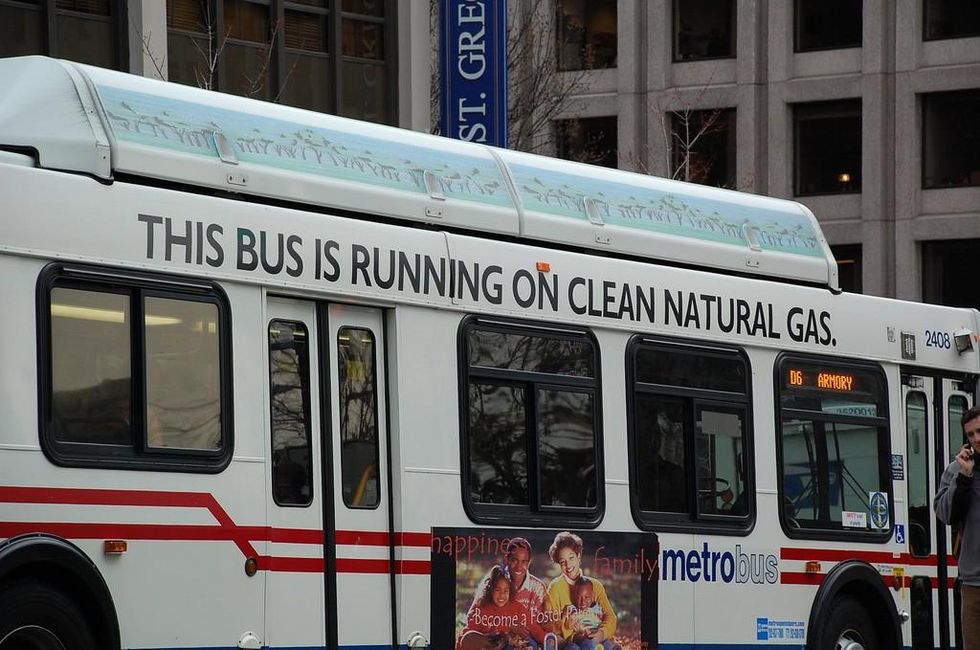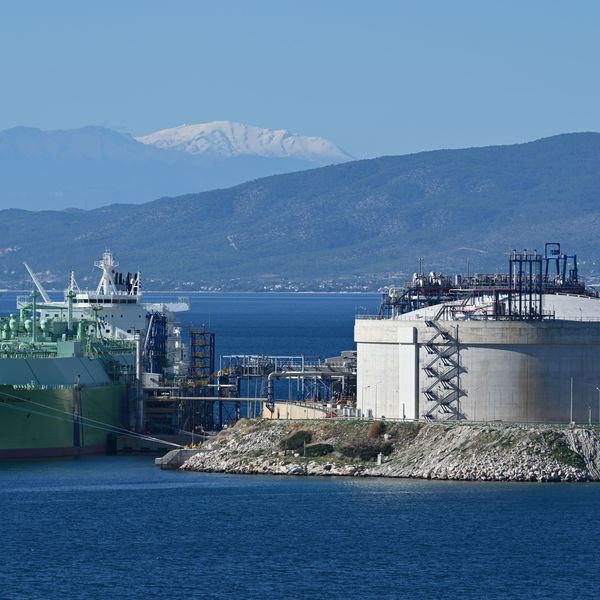'Bridge'? New Study Shatters Natural Gas Talking Point
New study reveals that methane emissions from natural gas may be 50 percent higher than EPA estimates

The findings, based on a review of over 200 previous studies, was published Friday in the journal Science.
Methane is about 30 times more potent of a greenhouse gas than carbon dioxide, so while President Obama has championed natural gas as a "bridge fuel" to address global warming, the climate implications of this "leaky" industry deserve scrutiny.
"People who go out and actually measure methane pretty consistently find more emissions than we expect," said lead author of the study Adam Brandt, an assistant professor of energy resources engineering at Stanford University.
"Atmospheric tests covering the entire country indicate emissions around 50 percent more than EPA estimates," said Brandt. "And that's a moderate estimate."
The amount could be as high as 75 percent greater, the researchers found.
Part of the discrepancy in the federal government's estimates of methane and those presented in the studies is because the EPA took measurements from sites in which companies participated voluntarily. The EPA also does not measure methane emissions from natural sites like wetlands. Atmospheric studies, in contrast, are able to be more encompassing.
Given the current level of methane leaks from the industry, switching trucks and buses from running on diesel to natural gas could actually be contributing to global warming, the study found.
"While studies like this are helpful, we need to act now to curb methane emissions."
--Sarah Uhl, Clean Air Task Force"Fueling trucks and buses with natural gas may help local air quality and reduce oil imports, but it is not likely to reduce greenhouse gas emissions. Even running passenger cars on natural gas instead of gasoline is probably on the borderline in terms of climate," Brandt said.
In order for that to be a greenhouse gas-beneficial switch of fuels, these methane leaks must be curbed, the study says.
Still, generating electricity from gas instead of coal is better for climate change, the researchers note.
"The study by Brandt et al. adds to a growing body of evidence suggesting that EPA's estimates of methane emissions from the oil and gas sector are too low," Sarah Uhl, Senior Project Director at the Clean Air Task Force, a Boston-based public health and environment advocacy group, said in a statement sent to Common Dreams.
"Fortunately, it costs little, or even pays, to stop these methane leaks and doing so is critical to meeting the President's publicly-stated pledge to reduce greenhouse gas emissions by 17% by 2020. Therefore, we are urging this Administration to tightly regulate methane emissions from the oil and gas industry. While studies like this are helpful, we need to act now to curb methane emissions," Uhl stated.
________________
An Urgent Message From Our Co-Founder
Dear Common Dreams reader, The U.S. is on a fast track to authoritarianism like nothing I've ever seen. Meanwhile, corporate news outlets are utterly capitulating to Trump, twisting their coverage to avoid drawing his ire while lining up to stuff cash in his pockets. That's why I believe that Common Dreams is doing the best and most consequential reporting that we've ever done. Our small but mighty team is a progressive reporting powerhouse, covering the news every day that the corporate media never will. Our mission has always been simple: To inform. To inspire. And to ignite change for the common good. Now here's the key piece that I want all our readers to understand: None of this would be possible without your financial support. That's not just some fundraising cliche. It's the absolute and literal truth. We don't accept corporate advertising and never will. We don't have a paywall because we don't think people should be blocked from critical news based on their ability to pay. Everything we do is funded by the donations of readers like you. Will you donate now to help power the nonprofit, independent reporting of Common Dreams? Thank you for being a vital member of our community. Together, we can keep independent journalism alive when it’s needed most. - Craig Brown, Co-founder |

The findings, based on a review of over 200 previous studies, was published Friday in the journal Science.
Methane is about 30 times more potent of a greenhouse gas than carbon dioxide, so while President Obama has championed natural gas as a "bridge fuel" to address global warming, the climate implications of this "leaky" industry deserve scrutiny.
"People who go out and actually measure methane pretty consistently find more emissions than we expect," said lead author of the study Adam Brandt, an assistant professor of energy resources engineering at Stanford University.
"Atmospheric tests covering the entire country indicate emissions around 50 percent more than EPA estimates," said Brandt. "And that's a moderate estimate."
The amount could be as high as 75 percent greater, the researchers found.
Part of the discrepancy in the federal government's estimates of methane and those presented in the studies is because the EPA took measurements from sites in which companies participated voluntarily. The EPA also does not measure methane emissions from natural sites like wetlands. Atmospheric studies, in contrast, are able to be more encompassing.
Given the current level of methane leaks from the industry, switching trucks and buses from running on diesel to natural gas could actually be contributing to global warming, the study found.
"While studies like this are helpful, we need to act now to curb methane emissions."
--Sarah Uhl, Clean Air Task Force"Fueling trucks and buses with natural gas may help local air quality and reduce oil imports, but it is not likely to reduce greenhouse gas emissions. Even running passenger cars on natural gas instead of gasoline is probably on the borderline in terms of climate," Brandt said.
In order for that to be a greenhouse gas-beneficial switch of fuels, these methane leaks must be curbed, the study says.
Still, generating electricity from gas instead of coal is better for climate change, the researchers note.
"The study by Brandt et al. adds to a growing body of evidence suggesting that EPA's estimates of methane emissions from the oil and gas sector are too low," Sarah Uhl, Senior Project Director at the Clean Air Task Force, a Boston-based public health and environment advocacy group, said in a statement sent to Common Dreams.
"Fortunately, it costs little, or even pays, to stop these methane leaks and doing so is critical to meeting the President's publicly-stated pledge to reduce greenhouse gas emissions by 17% by 2020. Therefore, we are urging this Administration to tightly regulate methane emissions from the oil and gas industry. While studies like this are helpful, we need to act now to curb methane emissions," Uhl stated.
________________

The findings, based on a review of over 200 previous studies, was published Friday in the journal Science.
Methane is about 30 times more potent of a greenhouse gas than carbon dioxide, so while President Obama has championed natural gas as a "bridge fuel" to address global warming, the climate implications of this "leaky" industry deserve scrutiny.
"People who go out and actually measure methane pretty consistently find more emissions than we expect," said lead author of the study Adam Brandt, an assistant professor of energy resources engineering at Stanford University.
"Atmospheric tests covering the entire country indicate emissions around 50 percent more than EPA estimates," said Brandt. "And that's a moderate estimate."
The amount could be as high as 75 percent greater, the researchers found.
Part of the discrepancy in the federal government's estimates of methane and those presented in the studies is because the EPA took measurements from sites in which companies participated voluntarily. The EPA also does not measure methane emissions from natural sites like wetlands. Atmospheric studies, in contrast, are able to be more encompassing.
Given the current level of methane leaks from the industry, switching trucks and buses from running on diesel to natural gas could actually be contributing to global warming, the study found.
"While studies like this are helpful, we need to act now to curb methane emissions."
--Sarah Uhl, Clean Air Task Force"Fueling trucks and buses with natural gas may help local air quality and reduce oil imports, but it is not likely to reduce greenhouse gas emissions. Even running passenger cars on natural gas instead of gasoline is probably on the borderline in terms of climate," Brandt said.
In order for that to be a greenhouse gas-beneficial switch of fuels, these methane leaks must be curbed, the study says.
Still, generating electricity from gas instead of coal is better for climate change, the researchers note.
"The study by Brandt et al. adds to a growing body of evidence suggesting that EPA's estimates of methane emissions from the oil and gas sector are too low," Sarah Uhl, Senior Project Director at the Clean Air Task Force, a Boston-based public health and environment advocacy group, said in a statement sent to Common Dreams.
"Fortunately, it costs little, or even pays, to stop these methane leaks and doing so is critical to meeting the President's publicly-stated pledge to reduce greenhouse gas emissions by 17% by 2020. Therefore, we are urging this Administration to tightly regulate methane emissions from the oil and gas industry. While studies like this are helpful, we need to act now to curb methane emissions," Uhl stated.
________________

